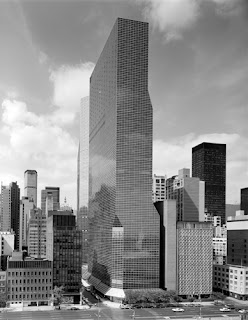New York, New York (1963-68). Ford Foundation Headquarters. Photo Ezra Stoller
New York, New York (1969-75). One United Nations Plaza Photo courtesy Kevin Roche John Dinkeloo and Associates
J.P. Morgan and Company Headquarters. Photo courtesy Kevin Roche John Dinkeloo and Associates
J.P. Morgan and Company Headquarters. Photo courtesy Kevin Roche John Dinkeloo and Associates
New York, New York (1980). Metropolitan Museum of Art, American Wing Court. Photo courtesy Kevin Roche John Dinkeloo and Associates
Oakland, California (1969). Oakland Museum of California. Photo courtesy Kevin Roche John Dinkeloo and Associates
¨The exhibition and catalogue—researched by Eeva-Liisa Pelkonen and her students at Yale, where the exhibition was first staged—argue that Roche is influential for considering architecture as a nexus of complex systems: urbanism, the environment, infrastructure, workplace organization, and architectural history. For his corporate clients, for instance, he researched organizational needs by systematically interviewing employees. This resulted in suburban office buildings of fractal intricacy, like the Whitehouse Station, New Jersey, headquarters of Merck (1993), its floor plan a colossal, crenellated hexagon, or the snowflake-like wings of the Union Carbide headquarters (1982) in Danbury, Connecticut.
Stylistically agnostic, Roche built in concrete, steel, and glass in vocabularies ranging from Brutalism to minimalism to postmodern classical references—or with some combination of the three. Much of his work is justifiably acclaimed, although the squat, yellow-and-green Kimmel Center (2003) at Manhattan’s New York University shows the limits of the systems-analysis design methodology when it neglects aesthetic components like form, proportion, and material.
The New York installation of the show emphasizes Roche’s influence on the city, particularly the landmark Ford Foundation Headquarters (1968) and his complete transformation of the Metropolitan Museum of Art (ongoing since 1967). Even better, the city itself is a perfect showcase of his work, with 13 completed buildings still standing throughout Manhattan.
Roche will join former New York Times architecture critic Nicolai Ouroussoff for a sold-out conversation at the Ford Foundation Headquarters on October 17, 2011. The exhibition closes on January 22, when it will travel next to the National Building Museum, Washington, DC, in July 2012, followed by the Eric Arthur Gallery, University of Toronto, next October.¨
Excerpt from Carl Yost´s article for Architectural Record, read it in full:






No comments:
Post a Comment